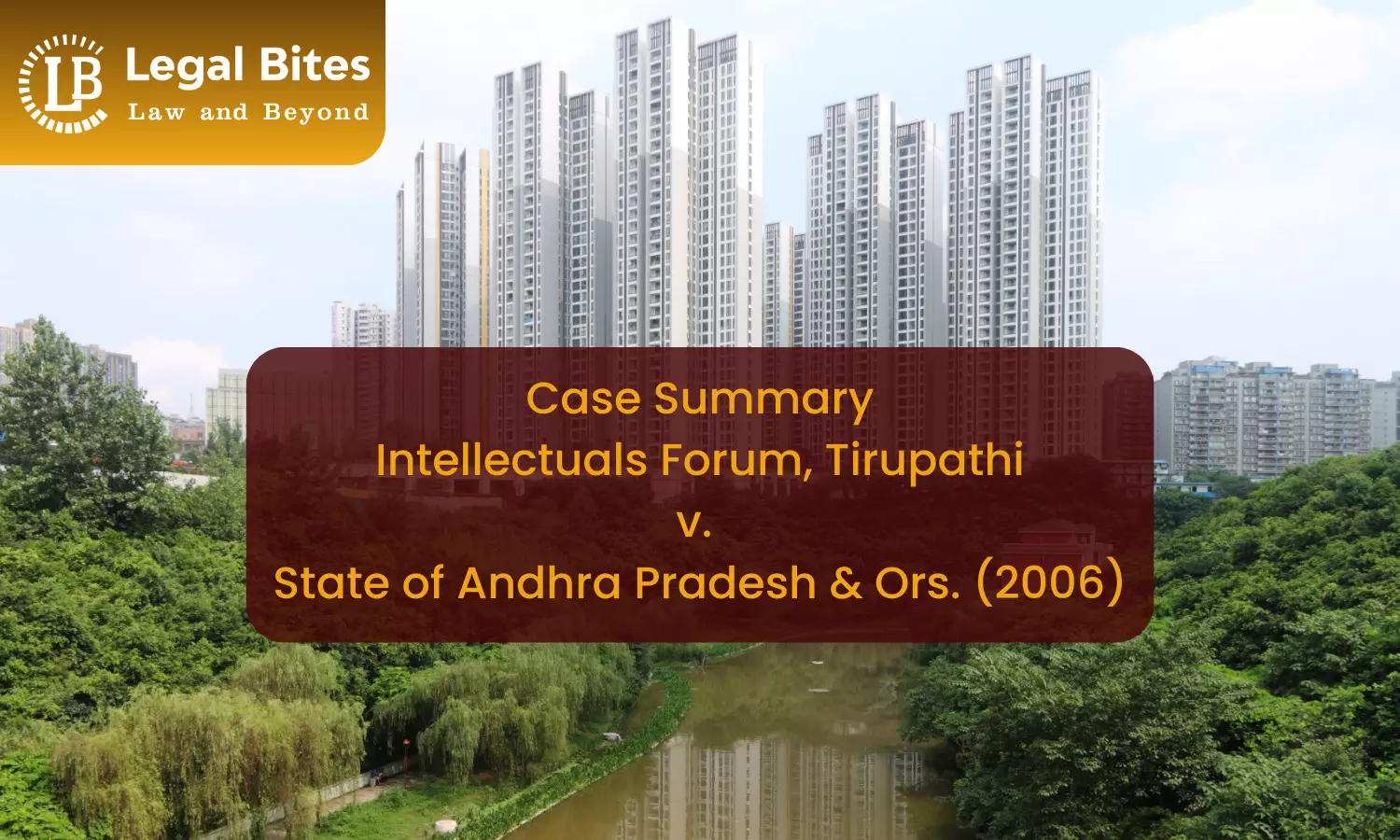Case Summary: Intellectuals Forum, Tirupathi v. State of Andhra Pradesh & Ors. (2006) | Environmental Protection and Sustainable Development
The Supreme Court emphasized the state's duty to protect the environment under the doctrines of public trust and sustainable development.

The case Intellectual Forum, Tirupathi v. State of Andhra Pradesh (2006) is a landmark judgment in Indian environmental jurisprudence focusing on the balance between urban development and environmental conservation, particularly in the context of public water bodies and sustainable development.
Case Title: Intellectuals Forum, Tirupathi v. State of Andhra Pradesh and Ors.
Court: Supreme Court of India
Citation: AIR 2006 SC1350
Judges: Ruma Pal and Dr. AR. Lakshmanan, JJ.
Date of Judgment: February 23, 2006
Case Background
The Government of Andhra Pradesh issued orders (G.O. Ms. No. 181 and G.O. Ms. No. 84) transferring the bed areas of Peruru and Avilala tanks in Tirupathi for urban development. These tank areas were given to entities like the Tirumala Tirupathi Devasthanam (TTD), the Andhra Pradesh Housing Board (APHB), and the Tirupathi Urban Development Authority (TUDA).
The tanks, of historical significance dating back to the time of Srikrishnadevaraya (1500 A.D.), were instrumental for irrigation and served as percolation tanks improving groundwater levels in the area.
The petitioners, a registered society called Intellectuals Forum, filed two writ petitions before the High Court of Andhra Pradesh. They argued that the systematic destruction and alienation of these tanks violated environmental protection principles and affected the local water resources crucial for the community.
The High Court dismissed these petitions, leading to an appeal before the Supreme Court. The Supreme Court established an expert committee to investigate the actions of the government.
Issues
Primacy of Urban Development vs. Environmental Protection: Whether urban development could be prioritized over protecting valuable environmental resources, particularly water bodies like the Avilala and Peruru tanks.
Constitutional Violations: Whether the state’s actions violated Articles 14 (right to equality) and 21 (right to life) of the Indian Constitution, as well as the Directive Principles of State Policy and fundamental duties related to environmental protection.
Sustainable Development: Whether the state’s development agenda ignored the principles of sustainable development, causing irreversible environmental damage.
Competing Public Interests: How the court should reconcile the competing claims of housing needs and environmental conservation.
Legal Reasoning and Findings
1. State’s Responsibility for Environmental Protection
The Supreme Court reiterated the state’s duty under international and domestic laws to protect and preserve the environment. Citing the United Nations Conference on the Human Environment (Stockholm Convention) and other international principles, the court emphasized that it is a well-accepted notion that governments are responsible for the pollution and environmental degradation originating within their territories.
The court referred to earlier judgments, such as M.C. Mehta v. Kamal Nath (1997) and the Corfu Channel Case (ICJ Reports, 1949), to assert the state’s responsibility in safeguarding natural resources.
The Supreme Court determined that the state’s actions were inconsistent with the constitutional mandate under Articles 14 and 21, as well as with the Directive Principles and Fundamental Duties related to environmental protection. The court reaffirmed that state actions must ensure that the right to life, including environmental protection, is upheld.
2. Sustainable Development and Public Trust Doctrine
The court discussed the concept of sustainable development, which seeks to balance economic growth with environmental protection. Referring to international declarations like the Brundtland Report (1987) and the Rio Declaration (1992), the court held that mere assertions of developmental needs do not justify environmental destruction. The court emphasized the Doctrine of Public Trust, stating that natural resources, such as tanks and lakes, are held by the state as trustees for public use and cannot be alienated or used in a manner inconsistent with this trust.
3. Review of Competing Public Interests
The court recognized that housing is a basic human need but highlighted that sustainable development should guide urban growth. It noted that in cases of conflict between the need for housing and environmental protection, a balanced approach must be adopted. The court found that the alienation of tank bedlands for housing purposes was inconsistent with environmental conservation efforts and that sustainable development principles had been overlooked.
4. Findings of the Expert Committee
Following an order from the Supreme Court, an expert committee was constituted to investigate the feasibility of using the Peruru and Avilala tanks for water harvesting.
The committee found that while the tanks could not be restored to their original form due to existing developments and loss of water sources, there was scope for creating percolation tanks and implementing rainwater harvesting methods to replenish groundwater levels.
Judgment
The Supreme Court accepted the expert committee’s report and issued several directions to ensure a balanced approach:
For Peruru Tank:
- No further constructions were allowed.
- The existing supply channels (Bodeddula Vanka) needed to be cleared and revitalized.
- A percolation tank and artificial recharge systems were to be developed in consultation with the Central Ground Water Board (CGWB).
- Mandatory rooftop rainwater harvesting systems were to be implemented for all existing houses, and no new borewells or tube wells were permitted.
For Avilala Tank:
- No further construction was allowed.
- Structures for rooftop rainwater harvesting were mandated for existing houses.
- An area of 40 acres was reserved for rainwater recharge, prohibiting any further development that could lead to ground concretization.
- Piezometers were to be installed to monitor groundwater levels.
The court held that the state authorities, as trustees of the communal property, had violated their duty by prioritizing economic development over environmental protection.
It directed the implementation of the expert committee's report and emphasized the importance of balancing development with environmental conservation to achieve sustainable growth.
Conclusion
The Intellectual Forum, Tirupathi v. State of Andhra Pradesh judgment underscores the need for sustainable development and the application of the Public Trust Doctrine in managing natural resources.
The decision also highlights the judiciary's role in ensuring that urban development does not override environmental protection, emphasizing that the state's obligation is not only to meet current developmental needs but also to safeguard resources for future generations.
The court’s directions aimed to reconcile the housing needs with the ecological requirements, ensuring a sustainable approach to urban development in Tirupathi.
Click Here to Read the Official Judgment

